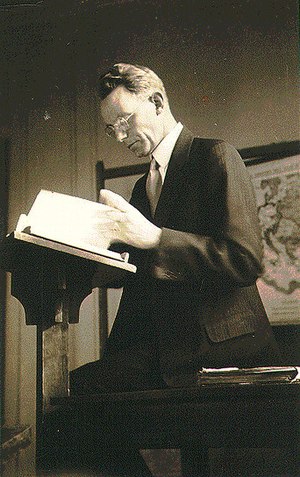
 The first aspect of ‘Reformed Apologetics’ that I’ll try and understand (explain) is the pretended or supposed neutrality of the unbeliever. I need to make it clear that I’m only just entering the world of Van Til, as such I’m very much on the periphery, learning to walk as it were.
The first aspect of ‘Reformed Apologetics’ that I’ll try and understand (explain) is the pretended or supposed neutrality of the unbeliever. I need to make it clear that I’m only just entering the world of Van Til, as such I’m very much on the periphery, learning to walk as it were.
If in our conversations with the unbeliever we allow them a neutrality toward the things of God, indeed toward God Himself, we do God a great dis-service (to put it mildly) and, actually of little help to the unbeliever. In his little booklet ‘Why I Believe in God’ Van Til compares his own upbringing in a Christian home to what we might call – at least to some extent – an educated unbelieving home. I’ve at last entered the world of un-diluted Van Til (pretty scary!). So in the context of our topic here’s a couple of quotes from ‘Why I Believe in God’.
“Shall we say then that in my early life I was conditioned to believe in God, while you were left free to develop your own judgment as you pleased? But that will hardly do. You know as well as I that every child is conditioned by its environment. You were as thoroughly conditioned not to believe in God as I was to believe in God. …. If you want to say that belief was poured down my throat, I shall retort by saying that unbelief was poured down your throat. ….”
He continues:
“How different your early schooling was! You went to a “neutral” school. As your parents had done at home, so your teachers now did at school. They taught you to be “open-minded.” God was not brought into connection with your study of nature or history. You were trained without bias all along the line.”
I’ve met these people, maybe you’re one them, that like to make a show of their open-minded worldview, of how neutral they are. Common sense tells us and them that such is not really the case. How then is the Reformed Apologetic any different from this quite obvious fact? Now that’s a good question. Maybe it’s no different at all. The answer is to be found in the way some approach (I know I have) the unbeliever and try to slug it out on neutral ground. The verse used for this could be 1 Cor 9:20-22 ‘To the Jews I became as a Jew, in order to win Jews. … I have become all things to all people, that by all means I might save some.’ Used this way, it seems to me now, is clear mis-use of the Biblical text. It must be so, and you’ll see why.
But, as soon as I step onto this pretended neutral space I have already given to the unbeliever the autonomy he already claims – indeed craves. In one sense, in a very real sense, the battle is at this point already lost to the unbeliever. We need to avoid aggression in our demeanor but intellectually as a direct clash of worldviews this is going to be quite difficult. Clearly, this is more than just having an argument and we ought to pray for Holy Spirit help in presenting Christ in all His confrontational glory.
This is where I’m at so far with this point. Obviously there’s much more to it than that – but I have to start somewhere. Remember I’m learning to walk.
Jim (see previous post comment) recommended ‘The Intellectual Challenge of the Gospel’ and if I manage to find it online I’ll link to it. I did find ‘Van Til’s Challenge to Illegitimate Common Ground’ by Dr. Greg Bahnsen. Iv’e not read this yet but it looks to be helpful (find it HERE). Bahnsen does explain neutrality with more detail in the ‘Westminster Professors’ lectures.
One of the objectives – for me – is to try to explain it in such a way that helps me realise whether I have actually grasped it or not. I would also like to explain it to others that might be struggling to get to grips with Van Til & PA.



 The rescue of the 33 miners in Chile has just been incredible. The pictures of joy are beautiful. I have watched and listened with amazement. At the resilience of the miners, at the skill and ingenuity of the engineers, at the dedication of the President (I’m not sure every leader would have stayed like he did).
The rescue of the 33 miners in Chile has just been incredible. The pictures of joy are beautiful. I have watched and listened with amazement. At the resilience of the miners, at the skill and ingenuity of the engineers, at the dedication of the President (I’m not sure every leader would have stayed like he did).